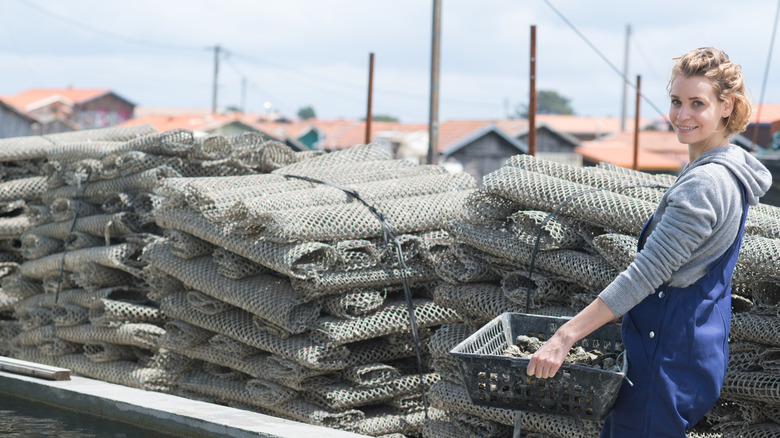How A French Farmer's Ingenious Hack Helped Stop Oyster Theft
Of all the things in the world you can recall being stolen, oysters might not be the first that comes to mind. But it is actually becoming a bigger problem than you might think. According to the East Coast Shellfish Growers Association, wholesale oyster prices can range between 30 and 70 cents, which might seem low given what you are likely to pay at a restaurant. But when thieves are stealing tens of thousands of oysters at once, it can add up quickly.
Boston.com notes it is a fear for many oyster farmers because these crimes are generally hard to solve, and, as Aquaculture North America (ANA) points out, many thefts can be devastating to the farmer's business. In 2019, the Pensacola Bay Oyster Company in Florida had over 30,000 oysters stolen. While the thieves were caught, company president Donnie McMahon told ANA, "We pretty much lost everything."
The best prevention has mostly relied on locals in the area keeping an eye out for unfamiliar boats around the oyster farm, Boston.com writes. But some farms are off-shore or in areas that are not easily monitored. ANA reports that some farmers are exploring some high-tech security options, like using security cameras to protect their farms or beacons that alert when oysters are moved. One 110-year-old oyster farm in western France even spent over €4 million for lasers that will engrave their company logo on the shells (via RFI).
However, another oyster farmer in France came up with an ingenious, low-tech hack to prevent his farms from being plundered; so far it has proven wildly successful.
A little slip of paper made all the difference
After French oyster farmer Christophe Guinot lost over 3 tons of oysters to thieves, he decided to get creative in finding a preventative solution, Reuters reported. His farm is in a coastal area near the French border with Spain, where the oysters are grown in wire mesh cages. Thieves go out in boats and simply take the cages out of the water.
Guinot decided to insert a note into an empty oyster shell, glue it shut, and put it in the cage. When that oyster is eventually opened, the thief will find said note stating they have won their weight in oysters and to dial the attached phone number to claim their prize. When they call, the farmer asks where the oyster was purchased, and, if sold by someone to whom he does not distribute, the police are notified.
While no one has claimed the "prize" from Guinot, other local farmers started trying this tactic as well, with some receiving calls and informing the authorities.
The plan has been a huge success. Guinot told Reuters that, since 2016 — when he put the method in place — he has not had any additional thefts, noting, "It has had a dissuasive effect." Per Reuters, thefts in the entire Languedoc area — where Guinot's farm is — have dropped dramatically also, with no oyster farm thefts being reported by the French Interior Ministry in 2020.

